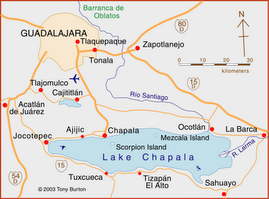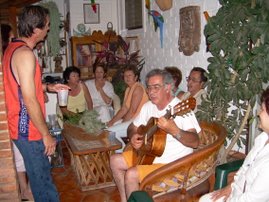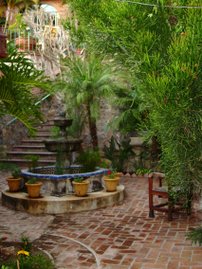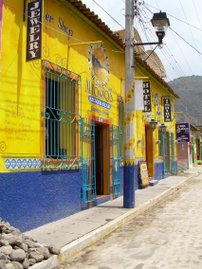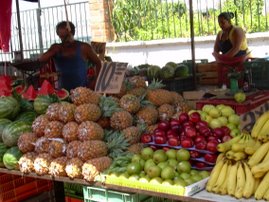skip to main |
skip to sidebar
 I was thinking a great topic for my blog entry this time might be the biggest thing for me this week: my colonoscopy. But Pixie suggested that readers of this blog might be less than enthusiastic about such details. Rather than continue with this idea and risk getting all pooped out by the effort, I had to find something else to write about.
I was thinking a great topic for my blog entry this time might be the biggest thing for me this week: my colonoscopy. But Pixie suggested that readers of this blog might be less than enthusiastic about such details. Rather than continue with this idea and risk getting all pooped out by the effort, I had to find something else to write about.
We have some friends, an American artist, Janice, and her Mexican husband, Teo, who attend our UU fellowship (Teo is the one who weaved the beautiful tapestry for our pulpit). Teo is pictured here with one of his original tapestries. Teo worked for many years as a migrant worker in California, but Janice convinced him he could make his living with his weaving. They now share a studio in Ajijic.
For some time Janice has befriended a family of Huichol Indians who were living in a vacant lot behind their house. The Huichols are an ancient people, descended from the Aztecs, who still practice the pre-Columbian shamanic traditions of their ancestors. For more information about this interesting indigenous group, check out this link: http://www.mexconnect.com/mex_/huichol/huicholindex.html

Anyway, Janice and Teo began helping this family and learning about them. Their story is interesting. The oldest son is named Teo, as is Janice's husband. (I will hereafter refer to him as HTeo, to differentiate him from Janice's Teo). HTeo is pictured at the left with his wife and two small children and three of his siblings, all wearing their traditional Huichol dress. HTeo came from a large Huichol family who lived in the mountainous area of Northern Jalisco. When he was young, his father separated from the tribe and his mother, and brought HTeo to live in Ajijic. Unfortunately, his father was an abusive alcoholic and HTeo grew up, essentially, homeless on the streets of Ajijic. He would go back and visit his mother when he could, but otherwise led a very difficult away from his people. About a year ago, or so, HTeo returned to visit his mother and the rest of his family in the mountains, with his father. While they were there, his father brutally murdered his mother in front of one of HTeo's young sisters. His father took off into the mountains and has not been heard from or caught. HTeo decided to return to his Huichol roots, and took responsibility for his large family. He is the oldest of eight children, and is married and has two children of his own. He returned with several of his siblings, leaving the others and his wife in the mountains, and found a small place to live in the Chapala area, where he is trying to make a living by selling his traditional Huichol bead work. Many of us became involved with this family when Janice was trying to help them survive here and asked if any of us could donate some money to help them pay their rent and buy food. Many of us did, and we has a chance to meet the family several times.

HTeo finally found a slightly larger place to stay, a one-room, 9 x 21 foot house with a bath and one bed, and has brought his other siblings and his wife and two children to live. There are now HTEo and his wife, their two children, and his seven siblings living in this house, eleven people in all. Two of his sisters and his wife (right) are pictured here. He is scraping together barely enough money to pay the 800 pesos monthly rent and buy food by selling his beadwork in the market in Ajijic.
Janice just informed us that HTeo has found a house in Chapala which he can have for five years, rent free. It is still a one room house, but much larger. The only problem is that it has no working bathroom and needs a floor.  A group of us who care about this family are going to look at this house on Friday and try to figure out how we can help HTeo and his family fix this house up so it's livable. I will update their story as it unfolds.
A group of us who care about this family are going to look at this house on Friday and try to figure out how we can help HTeo and his family fix this house up so it's livable. I will update their story as it unfolds.
On the left are three of HTeo's brothers, for whom he is the primary caretaker, plus his daughter. They were enjoying juice and donuts yesterday at Janice and Teo's studio. It was a chance for many of our friends to meet the family that we have decided to help. They were intrigued by their own images on my digital camera.
Below is a picture of a beaded mask we bought from HTeo. These masks are made of many tiny beads which are painstakingly and prayerfully embedded in beeswax. All the masks contain sacred images of the Huichol tradition. This mask has the sun on the forehead, a sacred deer head on the chin, and peyote mushroom "cookies, which they eat as part of all their rituals. Peyote is illegal in Mexico, but the government has made an exception for the Huichols. The candle on the nose is also part of their rituals.

(Note: you may notice that I have figured out how to incorporate some images into the text. You can click on these photos to see larger images.)
A few other notes: GOOD NEWS! The keys which we thought were in Pixie's purse when we were robbed have turned up in another bag. So the only loss from the robbery was about $40 in cash.. We have our keys, so nobody is running around with our car keys after all.
Cassie has found an apartment in Brookline for $450 a month and is moving in this week. She is looking forward to following her dream by studying professional illustration at the Art Institute of Boston starting on September 5th. Wendy and Troy are living happily on the lake in Oxford, Maine. Wendy has been doing well waitressing at Pat's and Troy is working on a farm and practicing his Spanish with his Mexican coworkers. They are saving money to travel in Mexico when they come down in January. Eric and Crystal report that her pregnancy is going well. Crystal has started teaching two sections of English Composition as part of her assistantship.
I have been writing quite a bit of poetry lately and am looking forward to getting some feedback in the Ajijic writer's group which meets twice a month at a local restaurant. I am not a very good poet, but I enjoy it and hope to get better. Pixie has been getting very creative with her card making. I think she should put some on consignment at a local boutique.
Several people have emailed expressing concern about Hurricane Dean. We were safe from the storm as we are near Guadalajara, in the mountains on the western side of the country, but still about 4 hours from the coast. Since it's made its second landfall, we are getting some rain today, but that's it. We're not vulnerable here, even to Pacific storms.
On another note, I was stopped by the police yesterday, this time unjustifiably. The officer claimed that I was driving the wrong way on a one way street (which I have been known to do, but not yesterday). He tried to tell me that I was in the wrong, which I knew I wasn't, but in Mexico, saving face is very important, so I was very agreeable, explained what I had done, and asked him to explain why I was wrong. He spoke good English, but gave me a vague answer. He asked to see my license and car importation papers. He was very nice but said he had to give me a ticket.
Smelling a shakedown, I was prepared this time. "Senor, I know I have to follow the laws, so if I have made a mistake, then give me a ticket."
"Do you know where to pay the ticket?"
"Yes, in Chapala."
"Oh, have you had a ticket before?"
"No, but I know my way around."
"Sir, let me discuss this with my partner"
His partner, who spoke very little English emerged from the car, after some discussion. I explained to him what I had done in the best Spanish I could muster. He looked at the original officer and said, I think, "Ello correcto," and smiled, waving his partner back into the car.
After a moment, the original officer approached me again. "Senor, I am going to be very nice to you today and let you go."
We all shook hands and smiled as though this had been some silly misunderstanding. I thanked both officers and went to return to the car. I noticed a young Mexican woman who had been standing in her doorway watching the entire episode. I rolled my eyes and shrugged. She shook her head and gave me a big smile.
Now that we are settled into the house and our community, we have started exploring the other areas around Lake Chapala. We are interested in what other areas are like, and we are also looking for places we can take people when they come visit. If you look at the map of the Lake Chapala area, you will see that Ajijic is on the north side of the lake. Last week we decided to explore the south side. (The towns I will discuss are not pictured on the map, but are west of the town Tuxcueca.)
As we head west around Jocotepec and head for the south side of the lake, we first come to a very small pueblo, San Pedro. There is not much here; it is a typical poor Mexican town. We saw a farmer working his land with a burro, people living in very basic houses, and a small center of town with, as always, a town plaza and a church. People were friendly but seemed unsure why we had come.
The next town, San Cristobal was a bit more developed. We stopped by the square where we looked at the wares the people were selling at the local market. I bought a hammer, which was a hand wrought head fastened to an aluminum pipe as a handle for 30 pesos. We looked for a round embroidered tablecloth for 150 pesos, but they were much too big for our table.
We have friends who live in the next town, San Luis Soyatlan, which is much bigger and more sophisticated than the other towns. Unbeknownst to us, they were having a fiesta last week, so we found the town square filled with vendors and carnival rides. We explored the lovely lakeside town and stopped for lunch at a local sidewalk eatery (Chile rellenos: chilies stuffed with cheese). We had brought Maggie with us so we made many friends in each of these towns, especially children.
We had heard about a town further south, away from the lake, high up in the mountains, called Mazamitla, which sounded very interesting. It was about 7500 feet above sea level and was a popular tourist destination. Since we were part way there (it was about 40 km south of Tuxcueca) we decided to check it out. The drive up was amazing. As we drove higher in the mountains, we saw pine trees along with the ever-present cacti. The town was very nice, with lots of restaurants and tourist shops. There were many cabins to rent, as in New England, and gorgeous views of mountains and valleys. We found a great shop selling incense and Che Guevara shirts, and Maggie was even more popular.
On the way to Guadalajara is a little town down in a valley with the unpronounceable name of Ixlahuacan. We decided to explore this town on Thursday with our friends Jeanne and Paul. By this time we were discovering that most Mexican towns have a certain similarity. There are many very utilitarian stores, or tiendas, selling other necessities. there is a big plaza which hosts vendors and a big market day once a week. Ixlahuacan was no exception. It was very friendly and picturesque.
Today we decided to travel to one more town east of Chapala: Mezcala. (On the shore, near Mezcala Island on the map). We ran into an unexpected adventure. The road is spectacular through the mountains with beautiful views of the lake. When we were almost there, we ran into a problem, a mudslide had completely blocked the road. A man on a bicycle told us of an alternate way into the town following a very rough dirt road. Since we had a 4WD car, we said, "Why not?" It took us about an hour, and we had to for at least three streams, but we made it. We were hungry and found a clean looking restaurant. We asked for a menu, but it was delivered orally. After much attempt to communicate, we finally agreed to eat whatever they
decided to serve us, which was delicious goat meat and rice. There is a wonderful museum there which has artifacts from the Cortez era, but it is only open Tuesday and Sunday. Today, unfortunately, was Monday. We'll have to go back .
In other developments, we have had no more problems with theft. Our landlord brought a dog form the shelter to "guard" the property at night, but she's so friendly that she won't do much good, I suspect. Nevertheless, things are pretty quiet here, but I lock up very carefully at night.
Today, Pixie and I signed up for Spanish lessons at the Lake Chapala Society. For $40 we can each take a three month course with other expats. We are speaking more and more Spanish; I am enjoying my conversations, but I am not doing it right. The Mexicans here are very tolerant, but learning the correct verb forms, etc. will help.
I have been accepted as a teacher to teach ESL classes to Mexicans on Tuesday and Thursday afternoons starting in September. I feel like our schedule is filling up. Besides our great books series, Pixie has joined a women's spiritual group, and I will be attending a writers' group twice a month. But I never intended to "retire," only to redirect my efforts in a different way.
Pixie continues to feel better; we went dancing for the first time in years on Friday night. I feel a little surprised that I don't miss work at all. For the first time in 31 years, I am not gearing up for another semester and getting my wood in for the winter.
One of the best parts about our move down here has been the great community of like-minded people we found at the Lake Chapala Unitarian Universalist Fellowship. When we lived in Maine, we had become active members of the First Universalist church in Auburn. When we first though of moving to Mexico, we knew we'd miss the fellowship we found at our church. When we arrived in Ajijic for the first time, we discovered that a group of liberal-minded people were in the process of forming a UU fellowship at Lakeside. Obviously, we were anxious to check it out. It was not much like our old congregation: there was no minister, they met in a restaurant, and there was no music. (When we went back in January, there was a woman who played the accordion for hymns, but she moved back to the US, so that was that, as far as live music was concerned.) But, like our church in Auburn, it was the people who were the clincher. They made us feel welcome and helped us with our transition to Mexico.
Today, the formation of the fellowship is almost complete. After about a year and a half, we have voted to formally charter the congregation and twenty-nine members have signed the book. We have adopted by-laws and will be electing our first Board at the September 9 meeting. We usually get between 20 and 30 people who show up each week at this time of year, and we should get many more once the snowbirds arrive. We meet now in our more permanent location: the synagogue in an adjoining town, Riberas de Pilar. (They don't use it on Sundays, and they rent it to us for $200 pesos a week with the stipulation that we don't eat pork on the premises.)
Our Sunday services are all lay-led, obviously, and we have incorporated many of the UU traditions into our service, including hymns and readings from Singing the Living Tradition, lighting a chalice at the beginning of the service, and sharing Joys and Concerns. We have some different traditions as well. Every week we have a sermon, either an original one delivered by someone in the community or one of our members, or one found on-line and read. Immediately after the sermon, we engage in a lively discussion of the sermon, which I like. It gives us a chance to amplify and sometimes debate some of the points and implications of the sermon. After the service, we go out to a restaurant and continue our discussions, often until 2:30 or 3 in the afternoon.
This group has been a great group of people for us to connect with immediately when we moved here permanently in May. We socialize with many of them through the week and even take excursions together. Our political interests and opinions tend to be fairly consistent, so we really enjoy each others' company. We visit Lynn and Gary's restaurant in Jocotepec; we've had dinner and played dominoes at Trudy and
Lew's; we get together regularly with Steve and Susan, our oldest friends here; we joined the Great Books discussion group with Jeanne and Paul; Pixie joined the Red Hat Ladies with Kathy, Bebe and others; Kevin and Diana showed us how to buy and cook the different fish here; and Sheldon took me around Guadalajara to show me the ropes of finding my way around. We've all been passing Michael Moore's movie, Sicko, around, and none of us agree on who the Democratic candidate for president should be, but no one, as far as I know, likes any of the Republican candidates! Some of these people, like us, may be a little crazy, but they are all interesting. Ana lived in the jungle for a couple of years when she first came here; Carole came down a couple of years ago on her social security, teaches part time, and gets by just fine without a car; Vincente, an artist, came for a few months and now may stay awhile; Kathy and Bob came down just with the stuff in their car like we did; and the list goes on and on.
Now we have live music occasionally: my guitar and some talented singers. We are actually planning a music service for later this month. We are debating what our social justice projects should be. Teo (our only Mexican member) and his wife Janice designed and wove a beautiful tapestry which adorns our pulpit every week . We advertise every week in the Guadalajara Reporter, and today we had five interested people attending for the first time. One of our members is recovering from a stroke, and people are visiting her and helping her while she is housebound. We are a vibrant and increasingly cohesive group.
Well, we HAVE had a dose of reality this week. Last Sunday night, we were broken into and robbed. We live in a compound of six cottages right down near the lake. We have a gated parking area, lighted grounds, and a caretaker who lives, with his family, right by the gate. We close up and lock the doors tot he cottage every evening, but, other than that, we haven't worried too much.
I woke up early, as usual last Monday morning and noticed that our glass door to the patio was ajar. We had had a thunderstorm and some wind, so I assumed that I had not fully latched the door. Later in the morning, Pixie could not find her pocketbook. We thought maybe she had left it at church the day before or at the restaurant where we went after church. We took a ride out to the restaurant, but they had not seen it. When we pulled into the parking area, she noticed her purse was hanging on the porch of one of the front cottages. When we checked inside, we noticed her cash was missing, but (GOOD NEWS) her ATM card and other cards were still there. (BAD NEWS) Her keys, including those for the house the gate and, ugh, the car, were missing. Daniel, the caretaker, and Dora, his wife, and Pixie and I checked the grounds and found evidence that the intruder had tried to get into some other homes, but ours was the only one robbed. I remembered the door had been open. When I checked it, I noticed that it was not locked (it always had been permanently locked from the outside, as soon as it was closed). The lock mechanism had apparently opened without me realizing it, so the intruder, seeing Pixie's purse on the table, walked in the open door and grabbed the purse, not taking my guitar or our laptop. (One of the great advantages of getting rid of almost everything we own is that there is not much to lose !) He was thoughtful enough to leave the purse and its other contents, but I wish he had left the keys.
SO....we changed the locks on the doors and the gate, bought a new security club for the car, and learned a valuable lesson about security. Although the gate secures the parking lot, the back end of the compound is easily accessible from the lake. Although there is rarely any violent crime, theft is a common problem, as one might expect. Coming from Maine, we were a bit spoiled. We are going to have an anti-theft device installed on the car, which is considerably cheaper than changing the car locks, and we are little worse for the wear, but we DO have a new appreciation for our vulnerability.
One another personal note, we just learned that we will soon become grandparents! Eric and Crystal, in Indiana, are expecting a baby in March. Now we are officially old geezers! Cassie is off to Boston this week to attend the Art Institute in the fall. Cassie and Alana will be visiting us for two weeks around Christmas. Wendy and Troy will be down for a month in January-February, and plan to spend a couple of weeks with us then a couple of weeks traveling in Mexico. Eric and Crystal don't know exactly when they'll be able to come, but we expect them to visit too. Curt and Judy Webber from Auburn will be down to visit at the end of October, and the Red SOX are STILL in first place! We are truly blessed.
I thought I would continue my last post on the subject of how we are experiencing living in a foreign country. My experience abroad, before now, has been strictly as a tourist. We stayed in hotels, ate in restaurants or from street vendors, and knew we would return home to the United States to our comfortable life and all those things we are used to. Now, of course, this is not a trip. We are not tourists; we are immigrants in a foreign land. In many ways, we are second-class citizens. We cannot vote, of course, but we cannot even express our political opinions or we are subject to deportation. The laws in Mexico, and even the enforcement of those laws are often very different from what we are used to. Here, we don't have the consumer or legal protections to which we have grown accustomed in the US. Add to that the fact that if there is a legal problem for us, we do not understand the system, and we are at the mercy of the Mexican government or law enforcement. Of course, we have had no serious problems, but you DO have to be alert and you cannot assume that people are looking our for your best interests, as much as you can in the United States. As an immigrant, you must get a legal visa which allows you to stay in the country. We had to pay $300 apiece to get this visa, called an FM3. This visa, which can be renewed every year for somewhat less expense, and allows you to travel outside of the country, allows you to live in Mexico indefinitely. To get this visa, you have to prove that you have enough income to survive here without working. If you do not have the income, you can get permission to work if you can prove that you will be working in an area which will not take a job from a Mexican citizen. If you try to work without a working permit, you are subject to immediate deportation. For this reason, the vast majority of Americans living in Mexico are retirees. We try to be good guests and appreciate the Mexican hospitality.
For many people, one of the adjustments to living in Mexico is not being able to get the same creature comforts you might have become accustomed to in the United States. For Pixie and I this is not a huge problem, but there are several items we miss. As avid tea drinkers, we have found the Mexican teas to be a mixed blessing. You can buy all sorts of herbal teas (lemon, chamomile, green, peppermint, etc.) in large packages for much less cost that the small herbal tea boxes available in the States. But for good old black tea, we prefer a British-style Tetley tea which is marketed in the US. The "te negro" here is weak and not as good. (We have given up trying to order hot tea in restaurants; the tea is lukewarm and weak.) Fortunately, we have brought a supply of tea bags with us, and our friends, Michael and Sue from Toronto who recently bought a home here, brought us a big box of Tetley when they came down a couple of weeks ago. The other product I miss is the micro-brew ales available so easily in Maine. Here, the only real choice you have is different types of Mexican lagers. I have found my favorite, a dark lager manufactured by Sol, called Indio. But, of course, it's not the same as a Gritty's bitter! Other than that, we are very content with Mexican foods, many of which are cheaper and more fresh than what we were used to. Another comfort item I do miss is comfortable furniture. Mexican furniture tends to be made of a cushion on a wooden platform, like beds, chairs, and sofas. As you might imagine, these are not as comfortable. More comfortable, American-style furniture is available, but for a high price. Pixie has been looking for one of those folding lounge chairs to use out by the pool. She saw one a few weeks ago for 400 pesos ($40) and hasn't seen one since. Go figure? I have always been a voracious newspaper reader. I could buy a USA Today for $4, or even a daily NY Times for God-knows-how-much, but I am satisfied here reading the only English language newspaper The Guadalajara Reporter, with local news, published every Saturday. I find I am reading my newspapers and some magazines online. (It is expensive to have magazines sent to a Mexican mailing address. Some Americans buy a US postal Box in Laredo Texas through Mailboxes Etc. for about $25-30 a month, but we have not found the need). Of course, as a die hard Red Sox fan, I can only see games occasionally when they broadcast the Sox on Fox on Saturdays. (We have a Canadian Satellite TV System). BUT, for $15 a year, I have subscribed to the MLB.com audio feeds of WRKO in Boston, so I sometimes listen to the games on the computer-- as I am now; Sox leading the Mariners 2-0 in the third inning. I DO miss Netflix, but we can rent videos at the Lake Chapala Society library and, of course, buy pirated films at the market for 30 pesos. The Canadian satellite has a few movie channels as well. Not Netflix, but okay. I used to belong to the Y (hi guys!) in Maine, but with the weather here, I usually walk into town every morning for my exercise. There are gyms here, but I'd prefer to walk for free. So...overall we have had to adapt to new products and services, but I am convinced we're gaining more than we are losing!
Many Americans, as I have mentioned before, take regular trips into Guadalajara to shop at WalMart, Cotsco, and Home Depot to buy the American products they are used to. They even organize bus trips to WalMart for gringos. For us, however, we seem to be able to get just about everything we need here at Lakeside, often Mexican products. Besides, I've been to these places, and you can't get Tetely Tea or Sam Adams beer, so what's the point?
One of the disturbing things about living here is to hear Americans dissing Mexico. I imagine most of these people only moved to Mexico for the climate and for the supposedly cheap prices. Other than that, they want life to be exactly as it had been for them in the US, and are disappointed when it is not. These people can be seen in local restaurants complaining that the management does not do things efficiently, making no attempt to speak Spanish, and generally acting as though they deserve special treatment because they have money. They often live in communities isolated from the Mexicans and spend an inordinately large amount of time worrying about theft and security. Needless to say, Pixie and I have been avoiding these types. Luckily, most of these people don't attend our UU fellowship.
I think one of the most striking feelings about living in a country where you obviously are different is the physical obviousness of your difference. I feel as though my light skin and lighter hair make me so obviously a gringo (and, by association, better off financially) that it feels foreign. When I wear my straw hat, it doesn't help. Gringos simply look different in straw hats; Mexicans look better in them, I think. I've never felt like an outsider before, based on the color of my skin. Although the Mexicans are warm and accepting, I can never, of course, be part of their culture. Having lots of American and Canadian friends is good in this way. I think it would be more difficult to move to a more remote area of Mexico with no other Americans. Still, I am obviously a foreigner here.



 A group of us who care about this family are going to look at this house on Friday and try to figure out how we can help HTeo and his family fix this house up so it's livable. I will update their story as it unfolds.
A group of us who care about this family are going to look at this house on Friday and try to figure out how we can help HTeo and his family fix this house up so it's livable. I will update their story as it unfolds.
